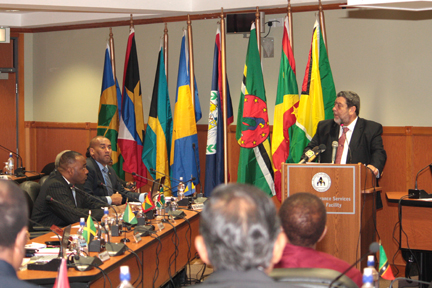
KINGSTOWN, St. Vincent, May 30, IWN — Prime Minister Dr. Ralph Gonsalves says implementing a fast ferry service in the southern Caribbean is a risk the private sector must take, with government assisitance.
“This is not as easy as some people think. It is a lot of money which is involved. In fact, the reason why you haven’t had it, despite all sort of efforts, is because it is a difficult proposition,” Gonsalves told the 43rd Special Meeting of CARICOM’s Council for Trade and Economic Development (COTED) on Wednesday.
Gonsalves, who has lead responsibility for transportation in CARICOM, however, said that regional governments can help private investors by offering them various concessions.
“These are easy things for us to do. We do that in St. Vincent and the Grenadines (SVG),” he noted, adding that ferries registered and operating in SVG, are imported tax-free, pay no taxes on their earning, and there is not value-added tax on the service.
He said that when a ferry operator imports a vessel, they are only required to pay a 4 per cent Customs service charge.
“So when [businesspeople] talk about a fast ferry service, … I say by all means, register the vessel in St. Vincent and you get all these concessions and we can work out with all the other countries to get these concessions. And we can provide the port facilities … And I use this platform to invite investors who want to get involved to do it,” Gonsalves said.
He, however, said that persons discussing a fast ferry service often want governments to fund at least a six-month trial run.
He said only Trinidad and Tobago in the region has such resources. “So, it really is going to be up to them whether they are going to fund it,” he further said, adding that a six-month trial will cost about US$5 million.
“And the enthusiasm of some ministers in some countries on this subject always comes up against the realities as spelt out by various ministries of finance,” said Gonsalves, who is the finance secretary here.
“If it is a financial proposition for the private sector. Let us give them all the concessions. I don’t see why we can’t give them all the concessions and I believe governments will give them all the concessions, certainly my government is doing it and I will encourage others to do the same.
“But you have to take the risk. Government might even be able to help you to source cheaper money than you would get going to a normal commercial bank… But let us get the serious people who want to be involved in the ferry business, let us get it on the road,” Gonsalves said.
His comments came even as he earlier noted increasing trade in agricultural produce between the Windward Islands and Trinidad and Barbados.
“In fact, the trade with Trinidad and Barbados now in agricultural produce from St. Vincent and the Grenadines exceeds by far the value of what you trade with Europe…” he said, adding that the situation was similar in Dominica and St. Lucia.
“So, among the things we have to talk about, is how we are transporting this produce. It is critical to addressing rural poverty and to address food security in the region.”
Gonsalves noted the importance of regional air and maritime transportation but also observed that it was the first quorate meeting of COTED dealing with transportation since 2007.
“Somehow, everybody talks about transportation being very importation but people just don’t find the time for us to sit down to talk about it. Well, I think that is changing,” he said.





